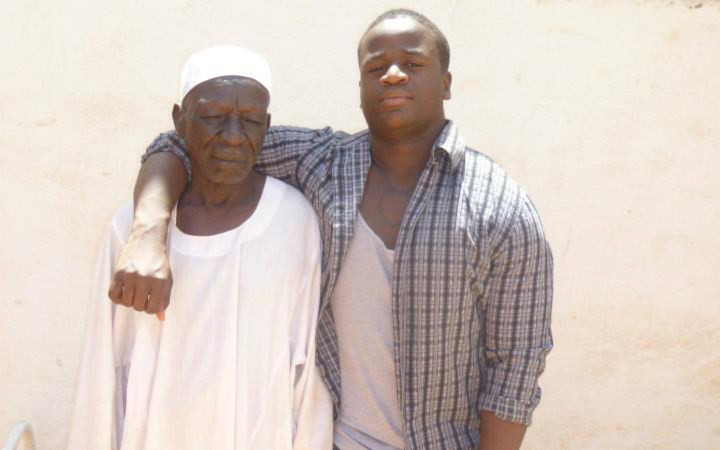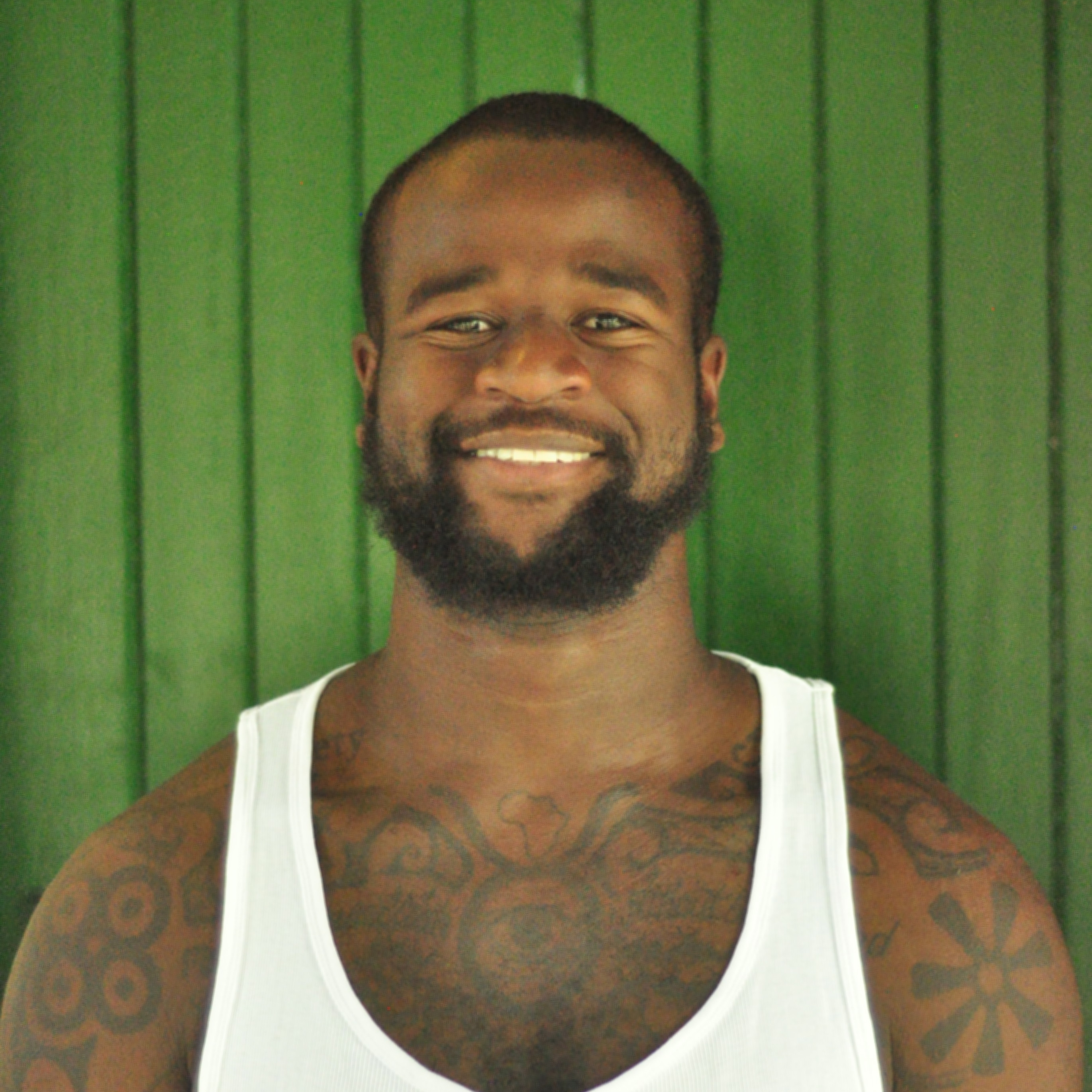My Grandpa Can’t Read
Muhammad Shareef
Listen to an excerpt from “My Grandpa Can’t Read”:
I wasn’t present in the United States when 9/11 occurred; I wasn’t even on the Western Hemisphere. During the historical moment, an incident that would spark a multi-generational war and plant the evil seed of Islamophobia, I was in Sudan. A dusty and sandy climate had replaced my Northern California habitat. My family described me as “a lost child of the Nile reconnecting with his original culture.”
There was a lot of noise the day following the September 11 attacks. People in town were scrambling to find the nearest television available, whether it was at a neighbor’s house or one of the local “dukkans,” to understand what exactly happened in that distant and unfamiliar nation. It seemed like everyone gathered around the tube, well everyone except the one person in my family I felt closest to, my grandfather. I recall finding him sitting outside his bungalow in his traditional jalabiya. Another man was sitting next to him and reading the day’s newspaper out loud. It was this moment that confirmed the suspicion that I had carried for a while; my grandfather was illiterate. He had a ritual of having someone read the news to him once a week. This was my grandfather’s only way of knowing what was happening outside of the Arkaweet suburb.
My grandfather’s lack of education wasn’t his fault despite what some Sudanese apologist might say. He used to live in the South Kordofan state before relocating himself and his family to Khartoum. He comes from the Nyimang tribe who are a sub-ethnic group of the Nuba people who reside in the Nuba hills. The Nuba people were known for their autonomy and fierce resistance towards British colonialism, which caused resentment from the Europeans. Unfortunately, the Sudanese central government internalized British attitudes after independence, so the country denied the Nuba people an adequate educational system. Like many of my grandfather’s tribesmen, he soon converted to an Abrahamic religion and adopted new ideologies that uprooted traditional Nuba beliefs; my grandfather began to abandon a culture that harbored gender equality, acceptance of fluid sexual identities, and freedom of expression.
My family’s long history of assimilation began. They conformed to a Sudanese society that convinced itself that black skin and an indigenous tongue were marks of barbarity. Arabic and Islam were the standard. I didn’t realize it then but the day after 9/11 gave me a glimpse of my family’s long struggle to pass in a world that rendered them invisible. My grandfather’s inability to read represents a nation’s grapple with racism, tribalism, and indigenous erasure. James Weldon Johnson wrote that “it’s no disgrace to be black, but it’s often very inconvenient.” Today my family continues feeling the need to pass to avoid the inconvenient.
I got in a heated argument with my mother during my last year in college. One day I found skin bleaching soap inside the restroom. My heart sunk at the sight of the familiar pink box that I’ve seen women carry and use to soothe their pain of being black. I immediately threw the soap in the trash without thinking twice. I knew deep in my heart, I could’ve avoided the conflict by minding my own business, but I was fed up with my kinfolk’s behavior. She was full of rage when she found the soap in the trash bin and repeatedly yelled that I had no right to throw away other people’s items. My mother also claimed that the soap didn’t belong to her. I still don’t know who owned the bleaching product, but that wasn’t the point. Its presence in the house is what angered me, and my mother’s failure to even acknowledge the problematic situation amplified my irritation. My younger brother once caught my aunt applying skin-bleaching ointment on her skin. He asked what it was and the justification of it being “medicine” was her reply. The women I grew up around could never achieve European or Middle Eastern standards of beauty, so they washed, rubbed, and injected their skin with harmful chemicals to negate their blackness. I guess this is the reason why I’m not shocked when I see a black person on Twitter stress the need for a mixed baby.
The daughters of my grandfather inherited his fixation, or burden if I had to choose a more accurate term, to assimilate. For them, passing was adjusting to a world that called you ugly. Passing meant chasing a mirage based on a fallacy. Passing was their only way of feeling accepted.
I stay up many nights reading about the history of Nuba people. I’m always fascinated by the tribe’s absence of toxic notions that govern the world today. Before assimilation, the Nuba people never sexualized or objectified women’s bodies, so nudity wasn’t obscene. Gender equality and fluidity made it impossible for rape culture and transphobia to exist. The inclusive paradise that brave feminists are fighting to establish once subsisted in this remote black society. I picture my grandfather leaving that world and what it did to him. He developed a manhood that came at the expense of women and his emotional growth. The control over the female body and property ownership defined his masculinity; however, since he lacked the education to achieve the later, my grandfather lived life with a sense of impotence that deeply scarred him. My love for my grandfather exceeds any criticism that I have toward him because his wounds connect with my experience with masculinity.
I remember doing everything I could to pass as a man. I wouldn’t cry because emotional vulnerability isn’t considered manly. I broke the heart of a girl I intensely cared about because I wanted to fulfill an image that awarded the disposal of women. Indifference from my lack of emotional intelligence, which I thought represented strength, was the answer to her tears. I wanted to be part of a large number of men whose identity endorsed sexism and patriarchal beliefs. My parody of courage spiraled me into years of depression after the relationship ended. Like my grandfather, I subscribed to cowardly behavior that we sold as true manhood for the sake of passing.
It’s impossible for me to talk honestly about my family without mentioning our struggle with assimilation. I had to question everything around me and myself to make sense of our pain. Passing means many things for us; it suggests beauty, validity, visibility, and acceptance but the essential meaning of passing is that one is considered human. I didn’t see an ignorant individual when I saw that my grandfather couldn’t read. I saw a man struggling with his identity. I was observing years of unlearning a beautiful culture, which based itself on love and community. I saw a young boy from the Nuba hills trying to prove his worthiness to the world. Ironically, he did know how to read, and it was the world that lacked understanding.
 Muhammad Modibo Shareef is a Sudanese-American writer who graduated from California State University, East Bay with a degree in Creative Writing. He enjoys writing about identity and the ways race, gender, sexuality, and class shape our experience. Shareef’s contributed to the 32nd issue of Occam’s Razor Literary Magazine. He is currently working on returning overseas to teach English. Shareef resides in Oakland, California but considers Sudan his home.
Muhammad Modibo Shareef is a Sudanese-American writer who graduated from California State University, East Bay with a degree in Creative Writing. He enjoys writing about identity and the ways race, gender, sexuality, and class shape our experience. Shareef’s contributed to the 32nd issue of Occam’s Razor Literary Magazine. He is currently working on returning overseas to teach English. Shareef resides in Oakland, California but considers Sudan his home.
Featured Image: provided by Muhammad Modibo Shareef.


Fillemon Shidhika
May 9, 2019 at 11:01 pmBravery